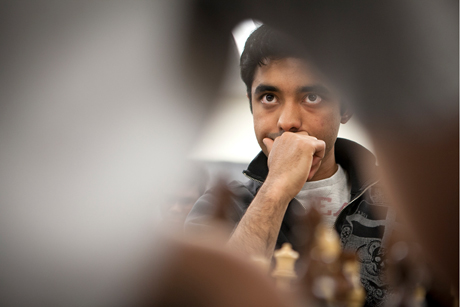Freshman ranks No. 2 among U.S. chess players
By Kathy Hovis
Adarsh Jayakumar’s dad used to beat him at chess – but only for a few months. And only when he was 10.
“These days, he mainly relies on ‘accidentally’ removing pieces from the board,” says Jayakumar ’17 of chess games with his dad. “And he’ll say, ‘Oh well, I guess we should keep playing anyway.’”
It’s no wonder that it’s tough for his dad to keep up with the Cornell freshman. Jayakumar is the No. 2-ranked 18-year-old chess player in the U.S., having beaten the likes of Ivan Sokolov, a Bosnian grandmaster.
The College of Arts and Sciences freshman took a year off after finishing high school outside Chicago, traveling across the country and the world playing chess and trying to gain “international master” status in the sport, which requires a player to be given a rating of 2400 by the World Chess Federation. Jayakumar got to 2340.
“Adarsh is a hard worker. In situations where other players would give up, he just keeps trying,” said Mesgen Amanov, a grandmaster from Chicago who’s been Jayakumar’s coach for the past four years. “During his gap year, he would come here sometimes four or five hours a day for lessons. He’s dedicated to reaching his goals.”
Getting ready for a chess match is part research, part psychological strategy, Jayakumar said.
To prepare for the Icelandic match against Sokolov, Jayakumar said he studied his opponent’s previous games using chess databases to memorize his most common moves and to see if he’d been working on a new “branch” (a series of moves). The data can also show how a player is feeling: aggressive, sad or anxious, Jayakumar said.

Really?
“Oh yes,” he said, “the more you understand his moods, the better you’ll do.” And observing an opponent’s behavior during a match is also vitally important.
“You can look at his eyes to tell what he might do next,” he said, “or to see how he’s feeling about the game.”
In the Sokolov match, Jayakumar said he secured a “nice advantage and then I squeezed him,” he said. “I ‘Sokoloved’ Sokolov. That’s exactly his style.”
After the match, Sokolov slapped down his king and shook Jayakumar’s hand, but he was clearly troubled. “It was quite a big upset,” Jayakumar said.
Chess is also a test of concentration, as a match typically lasts from four to six hours, he said.
Because of his chess prowess, Jayakumar said he had several offers for full scholarships from schools that courted him for his talent.
“I had to realize that what I wanted to do with my life wasn’t chess, even though it will always be an integral part of who I am,” he said. “I really want to make a difference in the world that isn’t chess-related.”
His interests lie in clean energy, he said, finding sustainable solutions to energy problems.
But he’s found that Cornell has a top-notch chess club, too, and he’s been encouraging its members to enter more tournaments. And in his spare time, he’s teaching a few friends the game.
“I love how colleges these days are getting into the sport a lot more,” Jayakumar said. “It used to be that once high school was over, you either went pro or you didn’t. But now you can go to an Ivy League school and get your education and still keep chess as such an integral part of your life.”
Kathy Hovis is a writer for the College of Arts and Sciences.
Media Contact
Get Cornell news delivered right to your inbox.
Subscribe